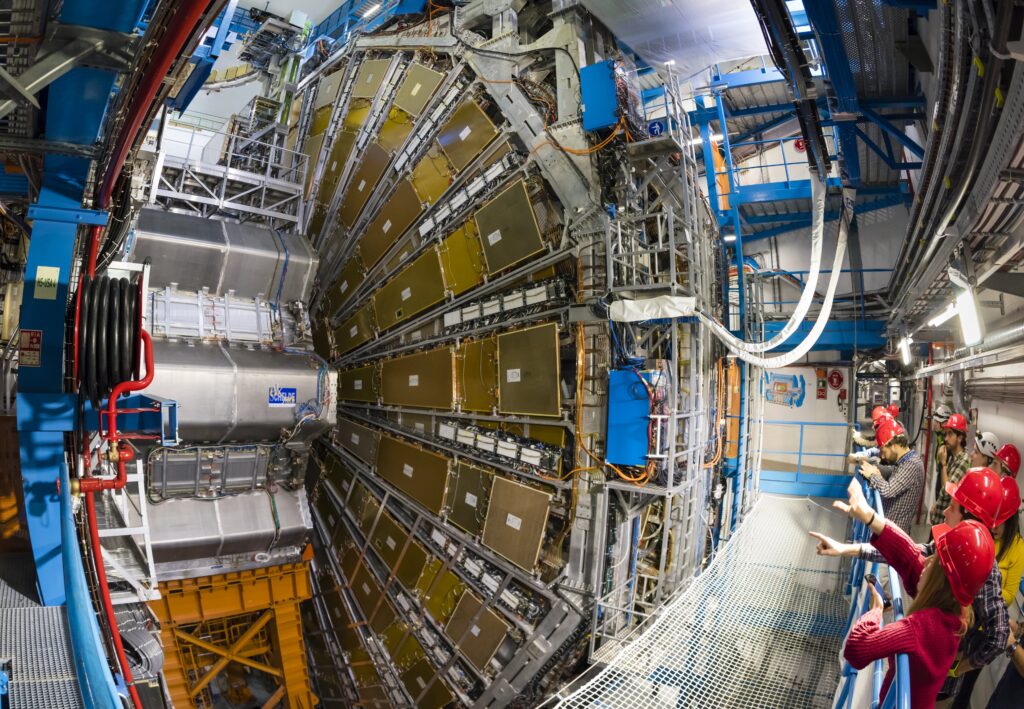On Tuesday, July 5, at a giant underground compound in Meyrin, Switzerland, physicists announced that they had discovered three “exotic” particles, never before seen by science — a feat accomplished via the world’s largest ring of superconducting magnets, also known as the Large Hadron Collider (LHC). For anyone who had gotten their science news from TikTok , the discovery of three new subatomic particles probably didn’t live up to the promise of a ” portal that’s gonna open on July 5 ,” or the widely shared notion that the event would look like a clip from the latest season of Stranger Things . People have been hyperventilating about this very, very big particle accelerator, which is run by the European Council for Nuclear Research (CERN), since Bill Clinton was president.
Back when the LHC was still being planned, some scientists believed that it would create a black hole, prompting the Italian physicist Francesco Calogero to write an essay in 2000 called “ Might a laboratory experiment destroy planet earth? ” That essay kicked off years of commentary, both serious and not, about the LHC killing us all, including John Oliver’s 2009 segment on The Daily Show in which he interviewed a science teacher who believed that its experiments had a “one in two chance” of creating an Earth-destroying black hole. Oliver also interviewed actual scientists at CERN, who were much more reassuring, but also much less funny. And yes, for all anyone knows, the LHC might have created black holes no one has been able to observe, and yet Earth is still here.
Two researchers proposed in 2011 that mini black holes “gravitationally bind matter without significant absorption. ” In other words, mini black holes drift around, not bothering anyone. The LHC wasn’t designed to create a black hole at all, but to figure out — among other things — why matter has mass.
In Geneva in 2012, CERN’s director general, Rolf-Dieter Heuer, announced to great fanfare that his team had discovered the Higgs boson particle. In short, using the LHC to smash particles together — as scary as that may be to some — was the quickest way to observe something called the Higgs field, a theoretical energy field that permeates everything, and imbues matter with mass. The particle Heuer and his team observed in 2012 matched theoretical calculations by British physicist Peter Higgs, who had first proposed the existence of such a field, and the particles that constitute it, so Higgs won the Nobel Prize, along with his colleague Francois Englebert .
Funnily enough, the CERN team was snubbed by the Nobel Foundation . Maybe they were mad about the whole black hole thing. But when the LHC was first fired up in 2008, there were hopes beyond just discovering the Higgs boson, which mostly just answered an obscure question about matter that few laypeople had ever bothered to wonder about.
One theoretical physicist, Erez Etzion, believed it might advance our understanding of other dimensions . Others hoped it would unlock the secrets of dark matter . None of that has happened, and the LHC failed to generate headlines for years — except in 2016 when a weasel climbed into the wiring and died, shutting the whole system down.
To quote Sabine Hossenfelder, former physicist and researcher at the Frankfurt Institute for Advanced Studies: “Let’s be honest: It’s disappointing. ” The LHC was taken offline for upgrades in 2018. CERN’s press release at the time said the outage would last for two years.
According to CERN, upon its revival it would achieve “higher beam intensities. ” Now, the LHC has finally come back to life. Apparently the upgrade was a success: CERN is taking a minor victory lap over the aforementioned discovery of a previously undiscovered type of “pentaquark” and two new “tetraquarks.
” Does that mean the LHC is a few more experiments from opening up a portal and zapping a demogorgon into our dimension? Given that the LHC had already given us tetraquark and pentaquark discoveries in the past , we should probably temper our expectations. New online campaign reminds us that street harassment isn’t a rite of passage. It’s a public health concern.
Malaysia tests AI court sentencing despite ethical concerns raised by lawyers MySejahtera data is safe and under gov, says M’sian minister after privacy concerns Apple’s digital ID is finally here, and so are the privacy concerns.
From: mashable
URL: https://sea.mashable.com/tech/20773/what-is-cerns-large-hadron-collider-up-to-in-2022-and-what-isnt-it
